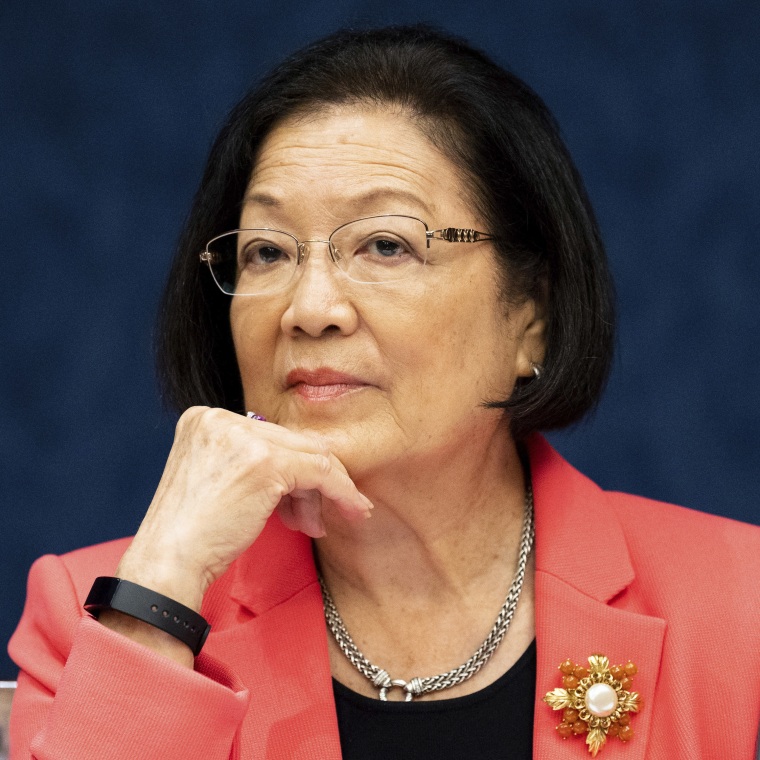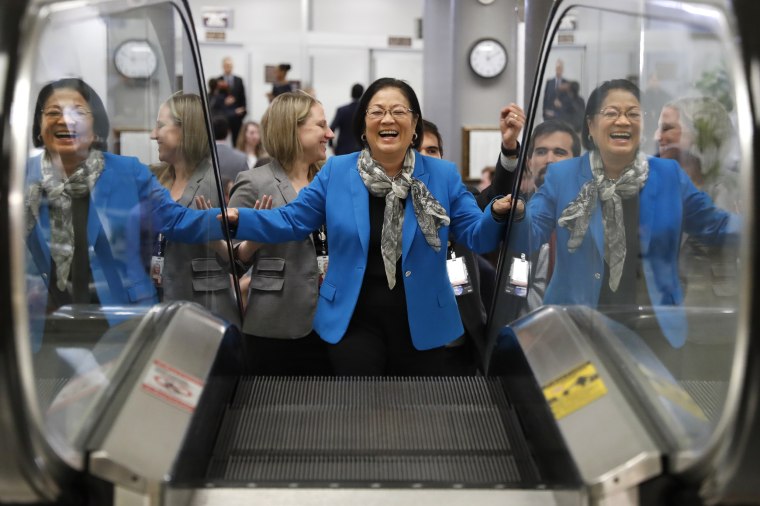Among the pivotal moments in Sen. Mazie Hirono’s life — one that forced her into heavy introspection — was when her ex-boyfriend and fellow rising star in the Hawaii political sphere proposed to her.
Allison Lynde and she had been together for nearly two decades, yet Hirono, D-Hawaii, said she would need time to mull over her decision. There was an expectation to “make it my primary responsibility to steady him, encourage him, soothe his moods, and smooth his way,” she wrote in her new memoir “Heart of Fire.” She often took on the role of cheerleader for Lynde, who she recalls had once asked her, “Why haven’t you pushed me to greater heights?” while her own wins were interpreted as threatening.
“I think it had more to do with just the dynamics of my relationship with him and the competitiveness that was in our relationship, which I consider to be a very negative aspect,” Hirono, who was 38 years old at the time, told NBC Asian America.

Hirono rejected Lynde’s offer, making it one of many instances in which she’s put her foot down in the face of the double standards women so often face. (She later married Leighton Oshima.)
The senator, the first Asian American woman and first immigrant woman to serve in the Senate, detailed the experience in her book, released last month, and has become known for such candid moments. From telling men to “just shut up and step up” and “do the right thing for a change” at a press conference following the sexual assault allegation against then-Supreme Court nominee Brett Kavanaugh in 2018, to walking out of a hearing that Sen. Ted Cruz, R-Texas, held on antifa last summer, Hirono said she hasn’t shied away from expressing her emotions. And women in general, shouldn’t have to hold back, she says.
Though many women of Asian descent, in particular, face cultural constraints that often keep them from speaking out, along with the competing Western expectation that they remain “subservient” or “meek,” Hirono, 73, argues that her expression has allowed her to “become more of a complete person.”
“It's very helpful if we speak up. Asian women should not be afraid of showing our anger,” she said. “When people see women exhibiting anger, and they'd like to place the description, such as ‘she's out of control,’ it doesn't bother me anymore.”
Hirono acknowledges this can be difficult for others to embrace, particularly from some Asian immigrants, for whom silence or compliance are sometimes considered the price of admission for stability in the United States. But the senator said that she barely felt the weight of such pressures from her own family.
In fact, her evolution into the brassy, bold politician she is known to be today began with her mother. A single parent, her mother plotted her escape to Hawaii from Japan and Hirono’s alcoholic, abusive father, and didn’t make traditional demands of her daughter, Hirono said. Instead, her mother encouraged her to pursue passions or take on endeavors that were not seen as particularly safe or stable, rather than call on her to get married and settle down.
“I asked her why she was not more vocal about … marriage. What she said was, ‘I ruined my life by getting married to your father, why should I tell you what to do?’” Hirono explained. “She and I were so close, that ... I never felt a need to rebel. This was during the 60s, 70s. And all the kids are rebelling, I never had to rebel against my mother because she never constrained me.”
Early on, Hirono took on pursuits that were considered unusual for Asian immigrants at the time, including protesting the Vietnam War — something that fewer than a handful of her classmates did, she said. But she wasn’t concerned with popularity. Instead, she had to shoulder the burdens of a working class, immigrant household.
“Protesting the war was not something I did because it was a cool thing to do. I really began to question what our country was doing,” she said.
Her strong-willed and independent spirit did not make her blind to the racialized sexism that Asian American women so often confront. According to a study from the think tank Coqual, formerly known as the Center for Talent Innovation, almost 1 in 4 Asian Americans feel out of place at work because of their race or ethnicity. Researchers also examined a sense of belonging along race and gender lines. White men had the highest “belonging score,” while Asian women exhibited the lowest.
“Clearly, being vocal, being aggressive, being confrontational were not rewarded behaviors, in my culture, in the Japanese culture, and particularly coming from a woman. So as I entered politics, I got things done by being very strategic and knowing what I was talking about,” she said. “I really did my homework. That's what women do, you know, we pretty much have to hunker down and do all this stuff, because we're not necessarily rewarded for being leaders.”
Due to Hawaii’s large Asian American population, Hirono said, racism was not as apparent as sexism in her interactions in the state’s political scene. However, years later, her status as a trailblazer in the Senate would expose her to colleagues with little experience with Asian Americans and a newer battle emerged.
“I think that they probably have some notions about Asian people, just generalization that we're all very nice and sweet. And, you know, we don't make a lot of noise. We work hard,” she said of her colleagues in the Senate. “And, and so I don't, I don't think I comport with that stereotype. ... That's why diversity is so important. It broadens your perspective of view.”
While much of Hirono’s conduct in her career draws from the resilience demonstrated by her mother, there are moments of anguish that have defined her, as well. In her book, the senator recounted the scar that the separation from — and later, the death — of her younger brother, Wayne, had on her and her family. Wayne was just 3 years old when Hirono, her older brother Roy, and her mother moved to Hawaii, temporarily leaving him behind in Japan with her grandparents. She said Wayne would glance at a photo of the family each day, hoping for their return. But Hirono wrote that regardless of the happy reunion they eventually experienced, he was forever wounded. This experience was a driving force in her advocacy of family reunification.
“His happiness at seeing us had burned like the sun, and yet he never again trusted that he would not wake up one day and find us gone,” she wrote. “His emotional health remained fragile, his schooling painful, and his life mostly solitary, save for his connection to us.”
Though he found reprieve in fishing, he drowned one day when he was 26 years old, the “loss of him to a churning sea had broken us all,” Hirono wrote. And while such weighty moments of trauma in Asian culture are often swallowed, held together with the will to forge ahead, Hirono said she had to unearth such emotions to make the case against the Trump administration’s “zero tolerance” policy that separated children from parents who were charged with illegal entry at the border. The policy, which has since been rescinded after Joe Biden became president, led to the separation of more than 3,000 migrant families.
“I've talked about my younger brother and let's face it, I don't think Asian families, as a matter of course, start talking about these very personal things,” she said. “But I told those stories in a very purposeful context of family separation, and so many of my lived experiences relate to the things that we are having to face.”
Particularly in today’s climate, when many Asian Americans are on the receiving end of the anxiety and blame amid the pandemic, the act of speaking out can feel enormous. But she affirms that “to stand our ground is to become more fully ourselves.”
“There have been many times in my life where I thought, ‘You should say something,’ and then I will hold back. So I try not to listen to that kind of voice so much anymore,” Hirono said. “I'm not saying we should turn into these really obnoxious, hateful, assholes. But ... through my journey, I've become more fully myself by exercising my vocal cords, and not just my brains and my heart.”
